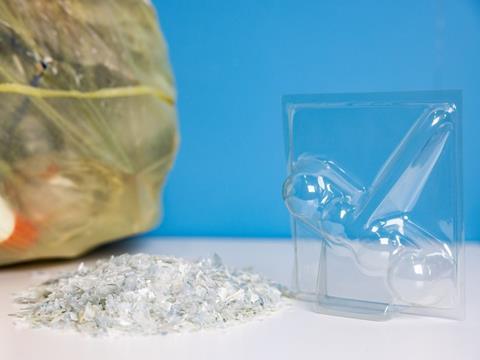
Henkel is piloting the incorporation of 100% post-consumer recyclate from the ‘yellow bag’ collection system – 80% of which apparently comes from recycled PET trays – into the blister packs for its WC FRISCH Kraft Aktiv Pro Nature Pack toilet fresheners.
Although the pack is said to already contain recyclate from PET bottles, Henkel hopes to close the loop on household collection systems by utilising recycled trays from the ‘yellow bag’. In this process, plastic, metal, and material waste are discarded in the same bag and sorted mechanically at dedicated sorting plants.
“While the recycling streams for returnable PET bottles and PET bottles from the yellow bag are already very well established, there is still a lot of potential in the reuse of PET trays from the yellow bag,” explains Ulf Timmann, head of Global Packaging Home Cleaning in the detergents and cleaning agents department at Henkel. “This is because plastic trays are often multi-layer packaging that cannot be processed into high-quality recyclate due to their complexity.
“Plastic shells made of mono-material, on the other hand, can be recycled very well, but usually only end up in thermal recycling, since they are not sorted separately and the corresponding recycling streams are not yet sufficiently available.”
Therefore, Henkel has worked with Boldog Consulting and PETman to develop a new recycling and manufacturing process – reportedly recycling around 20 tons of PET throughout the pilot. This is thought to translate to over 2 million blister packs for the WC FRISCH Kraft Aktiv Pro Nature Pack toilet fresheners.
“Thanks to the effective sorting of the plastic trays from the yellow bag according to material and colour, we can now produce monolayer films of high and stable quality,” says Kenneth Boldog, managing director of Boldog Consulting. “These foils are formed into high-quality blister covers, which in terms of quality hardly differ from the current blister covers made from recyclate from the returnable bottle system.
“In order to further develop process technologies of this type, there must be greater demand from industry. Henkel is sending a clear signal here.”
The companies anticipate the promotion and expansion of this technology to enable the wider use of materials sourced from Germany’s Dual System. For Henkel, it is expected to contribute towards its efforts to increase the amount of recyclate incorporated into its packaging to over 30%, in turn reducing the overall volume of plastics used.
Additionally, it aims for 100% of its packaging to be designed for recycling or reuse by 2025.
Henkel announced that its Pril dishwashing liquid brand would incorporate 50% PET recyclate from the yellow bag into its bottle bodies last summer. A similar distribution of rPET was implemented into its Pril Limited Edition bottle last week.
Swedish Plastic Recycling and ICA are also collecting and sorting household waste to produce bottles made with 95% recycled plastic for the SKONA detergent brand – a process that will eventually take place at the upcoming Site Zero facility.
If you liked this article, you might also enjoy:
McKinsey on whether or not on-pack sustainability claims affect consumer spending
A deep dive into the most important packaging sustainability trends and solutions














No comments yet